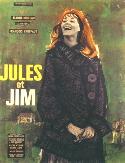|
François Truffaut's celebration of bohemian life in France and Germany in the years of artistic ferment between the First World War and the Second. The Austrian, Jules (Oskar Werner), and the Frenchman, Jim (Henri Serre)—the sort of young artists who grow up into something else—have a peaceful friendship. But when they are with Catherine (Jeanne Moreau), they feel alive; anything may happen. She's the catalyst, the troublemaker, the source of despair as well as the source of joy; an enchantress, she's also a fanatic, an absolutist, and a little crazy. Determined to live as fully as a man, she claims equality while using every feminine wile to increase her power position. She's the independent, intellectual modern woman satirized by Strindberg (who also adored her). Catherine marries Jules, who can't hold her, and, in despair, he encourages Jim's interest in her—"That way she'll still be ours." She insists on her freedom to leave men, but if they leave her (as Jim does), she is as devastated and as helpless as any clinging vine (perhaps more devastated—she can't even ask for sympathy). Elliptical, full of wit and radiance, this is the best movie ever made about what most of us think of as the Scott Fitzgerald period (though the film begins much earlier); Truffaut doesn't linger—nothing is held too long, nothing is overstated, or even stated. He explores the medium and plays with it. He overlaps scenes; uses fast cutting, in the manner of Breathless, and leaping continuity, in the manner of Zero for Conduct; changes the size and shape of the images, as Griffith did; pauses for Jeanne Moreau to sing a song (Boris Bassiak's "Le Tourbillon"). Throughout, Georges Delerue's music is part of the atmosphere; it's so evocative that if you listen to it on the phonograph, it brings back the emotions and images—such as Jim and Catherine's daughter rolling on a hill.
—Pauline Kael
|

Henri Serre, Oskar Werner, and Jeanne Moreau in Jules and Jim

French publicity poster for Jules and Jim |

